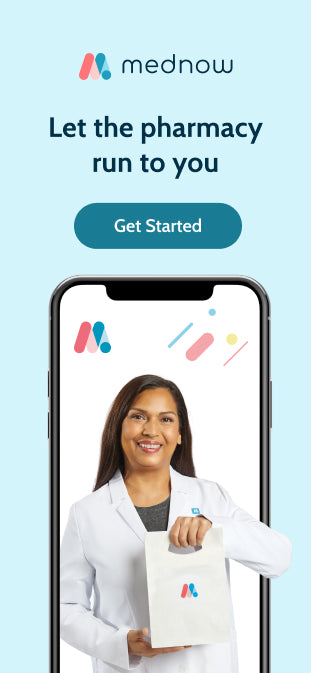Prescription medications often get tricky, especially if you deal with more than one doctor or pharmacy. It is important to keep in mind that a pharmacist is a key component of your healthcare team and an excellent resource if you have any questions about your medication regimen (both prescription and non-prescription).
At Mednow, we have a team of licensed pharmacists who can educate you on how to get the maximum benefit from your medication regimen.
Questions to Ask Your Pharmacist:
Many people have no idea what to ask the pharmacist. Following are some suggestions that can help you communicate with your pharmacist more effectively.
- What is the name of this medication?
It is vital to know what drugs you are taking and what they are intended to treat. Suppose you are seeing multiple doctors for different health issues. In that case, it is vital to share your entire medication history, such as prescription drugs, over-the-counter medications, herbs, supplements, minerals, vitamins, and teas, as some medicines may potentiate or negate the effect of your prescribed medications.
Each medication has a generic name (i.e., the standard name of the formulation, such as Acetaminophen) and a brand name (i.e., the name by which a certain manufacturer market / sell the drug such as Tylenol). Your medication label states the brand name, generic name, or both. It is recommended to maintain a list of all the medications you take with their respective dosage and why you are taking it. Don’t forget to share your list with your doctor, nurse practitioner, or pharmacist from time to time to evaluate if you should still be on those drugs. Learn more here.
- What does my medication do?
Every medication has an intended use. For example, antibiotics are prescribed to treat a bacterial infection, and painkillers are given to help manage the pain. It is helpful to know why you’re taking certain medication to have an idea of what to expect after taking the medication.
- How should I use my medication?
The correct dose and dosing frequency is key to achieving the desired therapeutic effect. For example, certain medications are best taken with food, while others are more effective when consumed on an empty stomach. Likewise, some drugs may cross-react with alcohol or other drugs (prescription, non-prescription, or herbal), thereby increasing or decreasing the drug's effect or duration of action. In addition, almost all the medications have some degree of side effects or adverse effects. Knowing when to take the drug for best results can minimize the risk of complications. For example, some medicines work best when taken at the same time every day, such as insulin should be taken according to your doctor's suggested regimen to maintain steady blood sugar levels.
- What would happen if I missed a dose?
It is highly recommended to follow the dosing schedule as closely as possible. If you are not great at following a schedule, ask your pharmacist about different apps, devices, and medication boxes to help you stay on track.
Some medications may have serious consequences if taken in high dosages. Likewise, you may need to take a make-up dose for some medications if you miss your scheduled dose. If you have missed a dose or have taken twice the prescribed dose, speak to a doctor or pharmacist immediately. At MedNow, we have a team of trained doctors and nurse practitioners who are available to help you through our Virtual Care program. Book an appointment to speak to a licensed doctor or nurse practitioner via call or chat to get advice on your medical diagnosis or prescription renewal.
- How long should I use this medication?
It is important to know how long you should take a certain medication as some medications are only advised for a short period such as antibiotics, whereas others may be needed for an extended period or even for the rest of your life. Examples are medications to control your blood pressure (antihypertensives) and blood sugar levels (antidiabetics). Serious complications may happen if you abruptly change or stop taking your medications. Likewise, serious side effects may occur if you take certain medicines for too long. In some cases, your doctor may advise you to lower the dose of the drug (also known as tapering) over a period to minimize the risk of complications such as steroids.
Be sure to strictly follow the advised dose and dosing regimen and do not stop taking medication if you are starting to feel better.
- What are the side effects of this medication, and what to do if I experience these side effects?
Every medication has some side effects or dose-dependent adverse effects that may or may not be serious. Therefore, it is advised to ask your pharmacist about the most common side effects and what to do if you experience the side effects. For example, some antibiotics may cause diarrhoea; but if you take the antibiotics after food, the risk of diarrhoea can be reduced. Before stopping a medication because of side effects, ask if any modifications can reduce the risk of side effects or if there is an alternative medication.
- Can I take herbal or other over-the-counter medications with my prescription drug?
Many herbal medications or non-prescription drugs can cross-react with prescription drugs and cause serious side effects. For example, dietary supplements like Vitamin K can antagonize or reverse the effects of anti-clotting prescriptions medications like Warfarin. If you take herbal or nutritional supplements, ask your pharmacist before starting a new prescription medication to avoid serious complications.
- Are there any specific storage instructions to keep the drug safe?
Some medications are susceptible and lose effectiveness when exposed to water, sunlight, or excessive heat. Storing medications in a bathroom medicine cabinet may not be a great choice for some drugs due to high moisture. Likewise, experts advise against storing your medications in cabinets where there is too much light as some drugs like ketoconazole undergoes degradation when exposed to light for over 24 hours. Other drugs that require special storage conditions are Erythromycin, Clarithromycin, Acyclovir, Tetracycline, Itraconazole, and Isotretinoin. Store your medications in a cool and dry place and ensure they are out of little children’s reach.
- When to follow up with a pharmacist or doctor?
It is important to ask what to expect after you start a new regimen and when you should schedule a follow-up appointment to discuss the progress. It is advised to speak to a doctor or pharmacist if you are experiencing unpleasant symptoms or side effects after starting a new medication. All side effects are not serious and do not require intervention. In fact, some side effects resolve without any intervention.
Likewise, some medications may take weeks to show a noticeable difference in the symptoms. If you are still in pain or discomfort after starting a new regimen for days, speak to your pharmacist or doctor to see if you should opt for an alternative option.
- What to do if I lose my medication?
If you have missed or lost your medication, reach out to your pharmacist at MedNow as soon as possible. At MedNow, we offer free online delivery of your prescription medication throughout Canada. Orders placed before 4pm are delivered the same day in most metropolitan areas. For other provinces, delivery may take up to 3-5 business days.
- What if I get pregnant?
Certain drugs can harm the developing baby and should not be taken if you are pregnant or looking to get pregnant. If you get pregnant while on a drug regimen, speak to your healthcare provider or contact our pharmacist at MedNow to know if you should continue your treatment regimen or look for alternative options.
At MedNow, we educate our clients in the reproductive age group about drugs that may affect the pregnancy or pregnancy outcomes so you can practice birth control while you are on that drug.
Conclusion:
At Mednow, we offer a free medication review where you can request a 1-1 consultation with our licensed pharmacists to:
- Maintain a list of all the medications you are taking (prescription, over-the-counter, supplements, herbs, etc.
- Evaluate to see if you should still be on all the medications.
- Assess if all your medications work together to improve your overall health and well-being.
If our pharmacist identifies a conflict or issue with your existing medication regimen, we contact your primary care provider to make adjustments.
How to get started?
To request your free 1-1 medication review at MedNow, you need your health card and a list of prescription, over-the-counter and herbal medications you take. We offer this service at no charge to you, whether you are an existing client or not. To schedule your free 1-1 medication review, visit here.
Take control of your health today. Check out our educational blog to learn more.
This article offers general information only and is not intended as medical or other professional advice. A healthcare provider should be consulted regarding your specific situation. While the information presented is believed to be factual and current, its accuracy is not guaranteed, and it should not be regarded as a complete analysis of the subjects discussed. All expressions of opinion reflect the judgment of the authors as of the date of publication and are subject to change. No endorsement of any third parties or their advice, opinions, information, products, or services is expressly given or implied by Mednow or its affiliates.
Get Started
